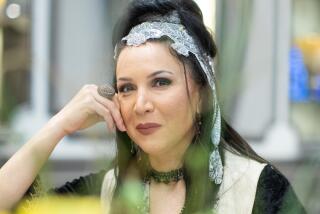Chance to play a hero
- Share via
Cairo — Why is Dr. Yehia Fakharani, one of Egypt’s foremost actors, riding around on a jackass these days, wearing the flowing djellaba of a peasant and sporting a wide grin as if he knows some deep wonderful secret?
Easy question. This is Ramadan, Islam’s holy month, when Arabs spend hours around their televisions, and networks broadcast their best soap-opera series of the year, like some holy sweeps month. And Fakharani, a physician-turned-actor who has portrayed King Lear and starred in some of Egypt’s top movies, finally has the chance to play the role he really wants -- that of Goha, the most revered mythical figure in the Arab world.
For Arabs, Goha is the Walter Mitty of Arabia, the little man living out his fantasies, always triumphing over great odds. He is lovable, eccentric, simple. His optimism is boundless, his generosity has no limits. He is said to be a fool, but he is clever and crafty and always outwits the sultans he encounters.
“To know Goha is to understand a bit more about the Arab peasant,” said Hussein Amin, a professor of media studies at American University in Cairo. “Goha adds a human dimension to the Arab character with his humor and self-criticism. It’s a dimension people don’t see in the West, where the Arab is often stereotyped.”
One American equates Goha with Yogi Berra. “You can’t quite figure out if what he says is really stupid or really smart,” he said.
Goha, who is said to have been born in Iraq, has been around for centuries. Whether such a character ever existed is unknown, but his stories are passed down through the generations.
Books are written about him in Iraq. He stars in a puppet show in Syria. Parents tell their children stories about him in Morocco. A political satire about him in 1985, “Goha Rules the City,” ranks as one of Egypt’s most popular plays since World War II.
Wise words
So this Ramadan, Arabs by the millions gather around their TV sets at 6:30 each evening to cheer the buffoon who proves more learned than the scholars.
Goha’s robe falls off a hook and he observes: “Thanks be to God, I wasn’t in it.” He loses his money in the desert one night and explains to a friend that he is searching for it in his house because “it is dark outside and here I have light.”
Egyptian television in general emphasizes soap operas, apolitical mixes of comedy and romance centering on Egyptians coping with everyday problems. “Goha,” in particular, provides a lighthearted and whimsical contrast to the economic and social tensions gripping Egypt as threats of war rise in Iraq.
Fakharani says playing Goha has put him in a good mood for the holy month of dawn-to-dusk fasting (it ends Dec. 30) by satisfying his longtime craving for the role. “You know how you feel like eating certain foods sometimes?” he asks.
Fakharani sees Goha as reflecting the masses’ cynicism toward the ruling elite and representing the homespun wisdom and stubborn optimism of the desert Arab.
Once, when the sultan wanted to teach his donkey to read and write, Goha volunteered. He said the task would take three years and he’d need a villa with servants. The sultan agreed. Time passed. Friends who visited found Goha lounging about. They warned him he would surely lose his head if he didn’t come up with a literate donkey at the end of three years. Goha was unperturbed.
“I shall not give up hope,” he said. “After all, one of four things might happen: The sultan may die, I may die, the donkey may die or -- who knows? -- the donkey may learn to read and write.”
More to Read
The complete guide to home viewing
Get Screen Gab for everything about the TV shows and streaming movies everyone’s talking about.
You may occasionally receive promotional content from the Los Angeles Times.






